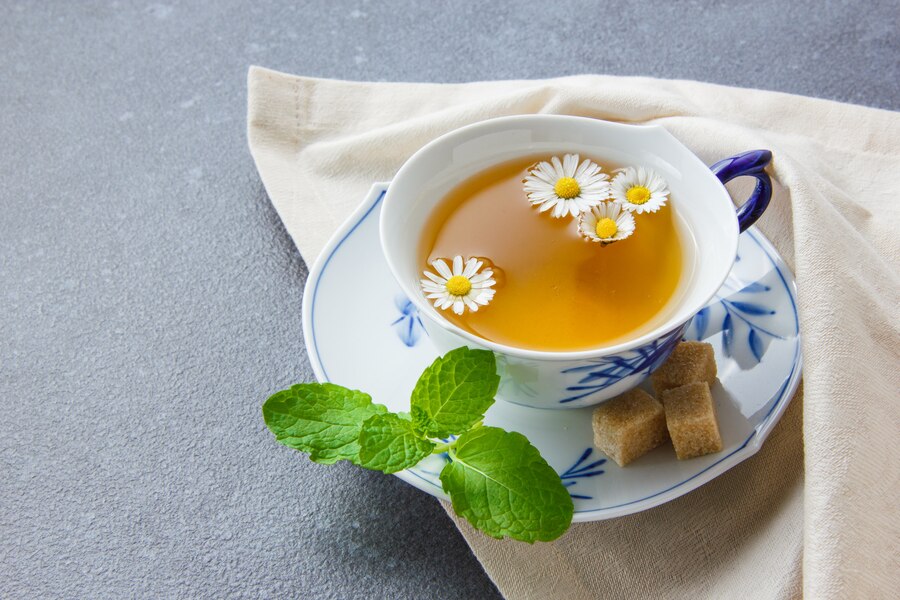Chamomile, derived from the daisy-like flowers of the Asteraceae plant family, has been used for centuries as a natural remedy for various ailments. Renowned for its calming and anti-inflammatory properties, chamomile is a versatile herb that can provide relief from pain and inflammation. This article explores the benefits of chamomile in reducing pain and inflammation, the science behind its efficacy, and practical ways to use it in your daily routine.
Benefits of Chamomile for Reducing Pain and Inflammation
1. Natural Pain Relief:
-
Chamomile contains compounds like flavonoids and terpenoids, which have been shown to possess significant anti-inflammatory and analgesic properties. These compounds help in reducing pain and providing relief from conditions such as headaches, muscle pain, and menstrual cramps.
2. Anti-Inflammatory Effects:
-
The anti-inflammatory properties of chamomile help reduce inflammation, making it beneficial for conditions like arthritis and inflammatory skin disorders. By inhibiting the activity of inflammatory enzymes, chamomile can help manage chronic inflammatory conditions.
3. Antioxidant Activity:
-
Chamomile is rich in antioxidants, which protect cells from oxidative stress and reduce inflammation. This contributes to overall health and aids in pain relief by promoting healing and reducing inflammatory responses.
Mechanisms of Action
1. Apigenin:
-
Apigenin is a flavonoid found in chamomile that has strong anti-inflammatory and analgesic effects. It works by inhibiting the production of pro-inflammatory cytokines and enzymes, thus reducing inflammation and pain.
2. Bisabolol:
-
Bisabolol is a key component of chamomile essential oil that possesses anti-inflammatory and soothing properties. It helps in reducing skin irritation and inflammation, making chamomile an effective remedy for inflammatory skin conditions.
Using Chamomile for Pain and Inflammation Relief
1. Chamomile Tea:
-
One of the most popular ways to use chamomile is by drinking chamomile tea. To prepare chamomile tea, steep 1-2 teaspoons of dried chamomile flowers in boiling water for 10-15 minutes. Drink up to three times a day to help manage pain and reduce inflammation.
2. Chamomile Essential Oil:
-
Chamomile essential oil can be used topically to provide localized pain relief. Dilute a few drops of chamomile essential oil with a carrier oil, such as coconut or jojoba oil, and apply to the affected area. This can help relieve muscle pain, joint pain, and inflammatory skin conditions.
3. Chamomile Compress:
-
A chamomile compress can be used to soothe sore muscles and reduce inflammation. Soak a cloth in warm chamomile tea and apply it to the affected area for 15-20 minutes. This method is especially effective for headaches and muscle pain.
4. Chamomile Bath:
-
Adding chamomile to your bath can provide overall relief from pain and inflammation. Add a few chamomile tea bags or a cup of dried chamomile flowers to your bathwater and soak for 20-30 minutes. This can help relax muscles and reduce pain throughout the body.
Precautions and Considerations
1. Allergies and Sensitivities:
-
While chamomile is generally safe for most people, individuals who are allergic to plants in the Asteraceae family (such as ragweed, marigolds, and daisies) should avoid using chamomile to prevent allergic reactions.
2. Dosage and Safety:
-
Chamomile is safe when used in appropriate amounts. However, excessive consumption of chamomile, especially in the form of supplements or essential oils, can lead to side effects such as nausea or dizziness. Stick to recommended dosages and consult with a healthcare provider if you have any concerns.
3. Drug Interactions:
-
Chamomile may interact with certain medications, such as blood thinners, sedatives, and anti-inflammatory drugs. If you are taking any medications, consult with your healthcare provider before using chamomile.
Health Benefits Beyond Pain and Inflammation Relief
1. Improved Sleep:
-
Chamomile is widely known for its calming effects, which can help improve sleep quality. Drinking chamomile tea before bed can promote relaxation and reduce insomnia, indirectly benefiting overall health.
2. Digestive Health:
-
Chamomile can aid in digestive health by reducing inflammation in the gastrointestinal tract. It helps alleviate symptoms of digestive disorders such as irritable bowel syndrome (IBS) and gastritis.
3. Skin Health:
-
The anti-inflammatory and antioxidant properties of chamomile make it beneficial for skin health. It can help soothe irritated skin, reduce redness, and promote healing of minor wounds and burns.
Chamomile is a powerful natural remedy for reducing pain and inflammation, offering analgesic, anti-inflammatory, and antioxidant benefits. By understanding how to use chamomile safely and effectively, individuals can incorporate it into their pain management routine and experience a more holistic approach to health. However, it is essential to use chamomile in moderation and consult with a healthcare provider for persistent or severe pain.




